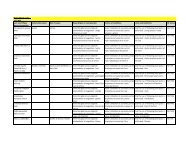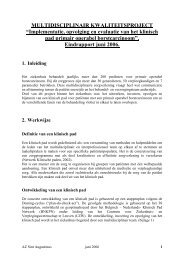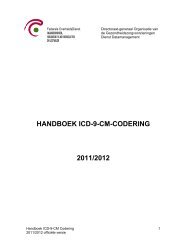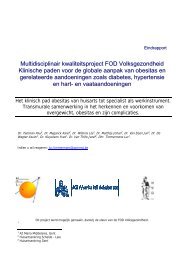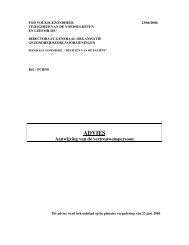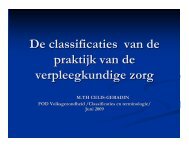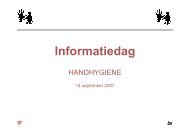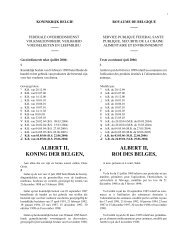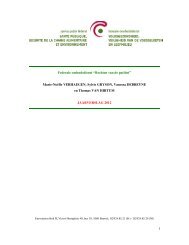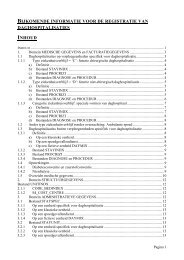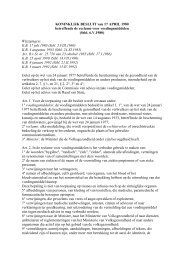- Page 1:
OPZETTEN VAN EEN DATABANK MET GEVAL
- Page 4 and 5:
Wat is BEST? BEST staat voor BElgia
- Page 6 and 7:
Zoekstrategie symptoommanagement se
- Page 8 and 9:
NEUROLOGISCHE ZORG.................
- Page 10 and 11:
Lijst met tabellen Tabel 1: Zoekfil
- Page 12 and 13:
Projectinhoud Inleiding Objectieve
- Page 14 and 15:
Methodologie Het opstellen van de d
- Page 16 and 17:
Gebruik van de website Aan het opst
- Page 18 and 19:
Figuur 1: Overzicht validiteit en b
- Page 20 and 21:
voorspelling wordt gemaakt op grond
- Page 22:
Figuur 2: Overzicht sensitiviteit -
- Page 25 and 26:
NAUSEA - VOMITING 22
- Page 27 and 28:
Inleiding nausea/braken Deze rubrie
- Page 29 and 30:
The Index of Nausea, Vomiting, and
- Page 31 and 32:
Gebruiksvriendelijkheid De gebruiks
- Page 33 and 34:
Author (year) V. Rhodes, P. Watson,
- Page 35 and 36:
Author (year) M. Fu, V. Rhodes, & B
- Page 37 and 38:
Author (year) Q. Zhou, B. O’Brien
- Page 39 and 40:
The Index of Nausea, Vomiting, and
- Page 41 and 42:
Vertaling: The Index of Nausea, Vom
- Page 43 and 44:
The Keller Index of Nausea (KIN) V.
- Page 45 and 46:
Opmerkingen De bekomen correlaties
- Page 47 and 48:
Results reliability Results validit
- Page 49 and 50:
The Nausea Profile (NP) E. Muth, R.
- Page 51 and 52:
Referenties Muth, E. R., Stern, R.
- Page 53 and 54:
Results reliability Results validit
- Page 55 and 56:
Reprinted with permission from Dr.
- Page 57 and 58:
Betrouwbaarheid Betrouwbaarheid wer
- Page 59 and 60:
Results reliability Results validit
- Page 61 and 62:
• de aandacht te vestigen op miss
- Page 63 and 64:
Author (year) L.L. Dupuis, A. Taddi
- Page 65 and 66:
The Pediatric Nausea Assessment Too
- Page 67 and 68:
Have you ever thrown up (use family
- Page 69 and 70:
Betrouwbaarheid Niet gespecifieerd.
- Page 71 and 72:
Results reliability Results validit
- Page 73 and 74:
Validiteit Validiteit van de VAS we
- Page 75 and 76:
Author (year) Boogaerts, J. G., Van
- Page 78 and 79:
DECUBITUSRISICO 75
- Page 80 and 81:
Inleiding evaluatie decubitusrisico
- Page 82 and 83:
De Bradenschaal Bergstrom, N., Brad
- Page 84 and 85:
Gebruiksvriendelijkheid De gebruiks
- Page 86 and 87:
Author (year) T. Defloor, & M. Gryp
- Page 88 and 89:
Author (year) Pancorbo-Hidalgo, P.
- Page 90 and 91:
Author (year) Gould, D., Goldstone,
- Page 92 and 93:
Braden Scale Bron: Bergstrom, N., B
- Page 94 and 95:
Vertaling Bradenschaal Bron: Defloo
- Page 97 and 98:
Reprinted with permission from Dr.
- Page 99 and 100:
In latere publicaties stelt de aute
- Page 101 and 102:
Norton, D. (1996). Calculating the
- Page 103 and 104:
Results reliability Results validit
- Page 105 and 106:
Results reliability Results validit
- Page 107 and 108:
Vertaling Nortonschaal Bron: Defloo
- Page 109 and 110:
SEDATIE 106
- Page 111 and 112:
Inleiding symptoommanagement sedati
- Page 113 and 114:
Bewustzijnsscores zijn interessant
- Page 115 and 116:
Betrouwbaarheid De betrouwbaarheid
- Page 117 and 118:
Results reliability Results validit
- Page 119 and 120:
Vertaling Motor Activity Assessment
- Page 121 and 122:
selecteren. De Ramsay Scale omvat
- Page 123 and 124:
Author (year) Mondello, E., Panasit
- Page 125 and 126:
Author (year) Ely, E. W., Truman, B
- Page 127 and 128:
Author (year) Sessler, C. N., Gosne
- Page 129 and 130:
Ramsey Scale Bron: Ramsay, M., Save
- Page 131 and 132:
The Richmond Agitation - Sedation S
- Page 133 and 134:
kunnen volgens 86,2% van de verplee
- Page 135 and 136:
Results reliability Results validit
- Page 137 and 138:
Results reliability Results validit
- Page 139 and 140:
Results reliability Results validit
- Page 141 and 142:
Vertaling Richmond Agitation-Sedati
- Page 143 and 144:
Betrouwbaarheid De interrater relia
- Page 145 and 146:
Author (year) Rassin, M., Sruyah, R
- Page 147 and 148:
Author (year) Riker, R. R., Picard,
- Page 149 and 150:
Author (year) Sessler, C. N., Gosne
- Page 151 and 152:
Sedation-Agitation Scale (SAS) Bron
- Page 153 and 154:
Dit helpt om bij gesedeerde patiën
- Page 155 and 156:
PIJN 152
- Page 157 and 158:
Inleiding symptoommanagement pijn H
- Page 159 and 160:
OR assessment self assessment (ps
- Page 161 and 162:
Beschrijving De BPI is oorspronkeli
- Page 163 and 164:
verpleegkundige praktijk. De omvang
- Page 165 and 166:
Results reliability Results validit
- Page 167 and 168:
Results reliability Results validit
- Page 169 and 170:
Results reliability Results validit
- Page 171 and 172:
Results reliability Results validit
- Page 173 and 174:
Results reliability Results validit
- Page 175 and 176:
Author (year) Tan, G., Jensen, M. P
- Page 177 and 178:
Brief Pain Inventory (Short Form) B
- Page 179 and 180:
Reprinted with permission from Dr.
- Page 181 and 182:
Reprinted with permission from Dr.
- Page 183 and 184:
gevalideerd bij ouderen met een cog
- Page 185 and 186:
Wong & Baker, 1988). Vergelijking v
- Page 187 and 188:
Wong, D. L. & Baker, C. M. (1988).
- Page 189 and 190:
Results reliability Results validit
- Page 191 and 192:
Results reliability Results validit
- Page 193 and 194:
Results reliability Results validit
- Page 195 and 196:
Results reliability Results validit
- Page 197 and 198:
Results reliability Results validit
- Page 199 and 200:
Results reliability Results validit
- Page 201 and 202:
Results reliability Results validit
- Page 203 and 204:
Results reliability Results validit
- Page 205 and 206:
Results reliability Results validit
- Page 207 and 208:
Results reliability Results validit
- Page 209 and 210:
Results reliability Results validit
- Page 211 and 212:
Results reliability Results validit
- Page 213 and 214:
Results reliability Results validit
- Page 215 and 216:
Results reliability Results validit
- Page 217 and 218:
Reprinted with permission from the
- Page 219 and 220:
Reprinted with permission from the
- Page 221 and 222:
• Een eerste deel omvat een teken
- Page 223 and 224:
Validatie Nederlandstalige versie D
- Page 225 and 226:
Author (year) Gagliese, L., Weizbli
- Page 227 and 228:
Author (year) Grafton, K. V., Foste
- Page 229 and 230:
Author (year) Melzack, R. (1975) Se
- Page 231 and 232:
Author (year) Wright, K. D., Asmund
- Page 233 and 234:
Author (year) Kaasalainen, S. & Cro
- Page 235 and 236:
McGill Pain Questionnaire Bron: Mel
- Page 237 and 238:
Short form McGill Pain Questionnair
- Page 239 and 240:
Numeric Rating Scale (NRS) Verschei
- Page 241 and 242:
Om de construct validity van de VAS
- Page 243 and 244:
Mawdsley, R. H., Moran, K. A., & Co
- Page 245 and 246:
Results reliability Results validit
- Page 247 and 248:
Results reliability Results validit
- Page 249 and 250:
Results reliability Results validit
- Page 251 and 252:
Results reliability Results validit
- Page 253 and 254:
Results reliability Results validit
- Page 255 and 256:
Results reliability Results validit
- Page 257 and 258:
Results reliability Results validit
- Page 259 and 260:
Results reliability Results validit
- Page 261 and 262:
Results reliability Results validit
- Page 263 and 264:
Vertaling Numerieke beoordelingscha
- Page 265 and 266:
Laatstgenoemde combinatie is een on
- Page 267 and 268:
properties and usability of selecte
- Page 269 and 270:
Author (year) Jensen, M. P., Chen,
- Page 271 and 272:
Author (year) Wong, D. L. & Baker,
- Page 273 and 274:
Author (year) Ware, L. J., Epps, C.
- Page 275 and 276:
Author (year) Jensen, M. P., Engel,
- Page 277 and 278:
Author (year) Kaasalainen, S. & Cro
- Page 279 and 280:
Author (year) Pautex, S., Michon, A
- Page 281 and 282:
Author (year) Herr, K. A., Spratt,
- Page 283 and 284:
Author (year) Taylor, L. J. & Herr,
- Page 285 and 286:
Author (year) Benaim, C., Froger, J
- Page 287 and 288:
Author (year) Pautex, S., Herrmann,
- Page 289 and 290:
Verbal Rating Scale Bron: Herr, K.
- Page 291 and 292:
Visual Analogue Scale (VAS) Versche
- Page 293 and 294:
Om de construct validity van de VAS
- Page 295 and 296:
Gagliese, L. & Katz, J. (2003). Age
- Page 297 and 298:
Author (year) Pautex, S., Michon, A
- Page 299 and 300:
Author (year) Freeman, K., Smyth, C
- Page 301 and 302:
Author (year) Pautex, S., Herrmann,
- Page 303 and 304:
Author (year) Bijur, P. E., Silver,
- Page 305 and 306:
Author (year) Herr, K. A., Spratt,
- Page 307 and 308:
Author (year) Van Dijk, M., Koot, H
- Page 309 and 310:
Author (year) Triano, J. J., McGreg
- Page 311 and 312:
Author (year) Gagliese, L. & Katz,
- Page 313 and 314:
Author (year) Stinson, J. N., Kavan
- Page 315 and 316:
Author (year) Benaim, C., Froger, J
- Page 317 and 318:
Author (year) Kim, E. J. & Buschman
- Page 319 and 320:
Horizontal VAS Bron: Huskisson, E.
- Page 321 and 322:
Vertaling Horizontale VAS Instructi
- Page 323 and 324:
320
- Page 325 and 326:
Overzicht meetinstrumenten evaluati
- Page 327 and 328:
OR Zoekstrategie evaluatie mondstat
- Page 329 and 330:
Er werd gepreciseerd wat men met be
- Page 331 and 332:
Author (year) Kayser-Jones J., Bird
- Page 333 and 334:
Kayser-Jones Brief Oral Health Stat
- Page 335 and 336:
Graad Omschrijving Graad 0 Geen sym
- Page 337 and 338:
De tabel bevat dus 8 items: lippen,
- Page 339 and 340:
Author (year) CHALMERS JM., KING PL
- Page 341 and 342:
Oral Health Assessment Tool (OHAT)
- Page 343 and 344:
Voor elke soort aantasting in elk m
- Page 345 and 346:
Author (year) McGuire DB, Peterson
- Page 347 and 348:
The 20 items Oral Mucositis Index (
- Page 349 and 350:
Hoe hoger de totale score, hoe erge
- Page 351 and 352:
Results reliability Results validit
- Page 353 and 354:
350
- Page 355 and 356:
Overzicht meetinstrumenten vermoeid
- Page 357 and 358:
Inleiding vermoeidheid Deze rubriek
- Page 359 and 360:
Brief Fatigue Inventory (BFI) Mendo
- Page 361 and 362:
Vindplaats van het instrument: http
- Page 363 and 364:
Results reliability Results validit
- Page 365 and 366:
Beschrijving: Het gaat om een korte
- Page 367 and 368:
Author (year) Krupp LB., LaRocca NG
- Page 369 and 370:
Fatigue Severity Scale The Fatigue
- Page 371 and 372:
Deze schaal levert 2 scores op: een
- Page 373 and 374:
Results reliability Results validit
- Page 375 and 376:
372
- Page 377 and 378:
Het gaat om een vragenlijst van 13
- Page 379 and 380:
Hagell P., Höglund A., Reimer J.,
- Page 381 and 382:
Results reliability Results validit
- Page 383 and 384:
die is ondervonden op de dag voor d
- Page 385 and 386:
Author (year) Smets E.M.A., Garssen
- Page 387 and 388:
Multidimensional Fatigue Inventory
- Page 389 and 390:
Het is mogelijk om de meer objectie
- Page 391 and 392:
Results reliability Results validit
- Page 393 and 394:
390
- Page 395 and 396:
Betrouwbaarheid: De Cronbach’s al
- Page 397 and 398:
Author (year) Piper B., Lindsey A.,
- Page 399 and 400:
Revised Piper Fatigue Scale (R-PFS)
- Page 401 and 402:
te hebben alsook het affectieve asp
- Page 403 and 404:
Results reliability Results validit
- Page 405 and 406:
402
- Page 407 and 408:
404
- Page 409 and 410:
Betrouwbaarheid: De Cronbach’s al
- Page 411 and 412:
Author (year) Lee KA, Hicks G, Nino
- Page 413 and 414:
VISUAL ANALOGUE SCALE FOR FATIGUE (
- Page 415 and 416:
FUNCTIONEEL - MENTAAL - PSYCHOSOCIA
- Page 417 and 418:
to Predict Which Elderly Inpatients
- Page 419 and 420:
Inleiding bij het onderwerp “func
- Page 421 and 422:
Tabel 7: Zoekfilter voor het deel F
- Page 423 and 424:
Autonomie gérontologique et groupe
- Page 425 and 426:
Author (year) Neirynck I,, Closon M
- Page 427 and 428:
Berg Balance Scale Berg, K. el al (
- Page 429 and 430:
Variant Chou et al (Chou et al.2006
- Page 431 and 432:
Author (year) Berg, K. O., Wood-Dau
- Page 433 and 434:
Author (year) shigeru usuda, kazufu
- Page 435 and 436:
Author (year) Liston, R. A. and Bro
- Page 437 and 438:
Functional Independence Measure (FI
- Page 439 and 440:
Opmerkingen Voor het afnemen van de
- Page 441 and 442:
Result reliability (E) Interrater r
- Page 443 and 444:
Result reliability (S) Test retest
- Page 445 and 446:
Result reliability (IC) Internal co
- Page 447 and 448:
Betrouwbaarheid De betrouwbaarheid
- Page 449 and 450:
Author (year) Van Marwijk, H. W., W
- Page 451 and 452:
Author (year) Agrell, B. and Dehlin
- Page 453 and 454:
Identification of senior at risk (I
- Page 455 and 456:
McCusker, J., Bellavance, F., Cardi
- Page 457 and 458:
Result reliability (S) Stability Th
- Page 459 and 460:
afhankelijkheid. De totale score ko
- Page 461 and 462:
Author (year) Cromwell, D. A., Eaga
- Page 463 and 464:
Katz index of Independance in Activ
- Page 465 and 466:
Katz S, Vignos PJ, Moskowitz RW, et
- Page 467 and 468:
Result reliability (IC) Internal Co
- Page 469 and 470:
Beschrijving De PEDI meet de functi
- Page 471 and 472:
Result reliability (IC) Internal Co
- Page 473 and 474:
3,5 - 4,5 punten: laag risico 5-6 p
- Page 475 and 476:
Result reliability Result validity
- Page 477 and 478:
Vertaling: Ziekenhuisscore ter eval
- Page 479 and 480:
St. Thomas's Risk Assessment Tool I
- Page 481 and 482:
Milisen, K., Staelens, N., Schwendi
- Page 483 and 484:
Results reliability Results validit
- Page 485 and 486:
Results reliability Results validit
- Page 487 and 488:
Bij een herziening van de schaal we
- Page 489 and 490:
Author (year) Hebert et al. 1988 Ag
- Page 491 and 492:
Mini Motor Test (MMT) Camus, A., Mo
- Page 493 and 494:
Camus, A., Mourey, F., d'Athis, P.,
- Page 495 and 496:
Results reliability Results validit
- Page 497 and 498:
Betrouwbaarheid De interne consiste
- Page 499 and 500:
Author (year) Mahoney & Barthel (19
- Page 501 and 502:
Bristol Activities of Daily Living
- Page 503 and 504:
Author (year) Bucks, R. S., Ashwort
- Page 505 and 506:
Bristol Activities of Daily Living
- Page 507 and 508:
11. MOBILITY 12. ORIENTATION - TIME
- Page 509 and 510:
Vertaling: Bristol Activities of Da
- Page 511 and 512:
10. OPSTAAN EN GAAN ZITTEN 11. MOBI
- Page 513 and 514:
Timed “Up & Go” (TUG) Podsiadlo
- Page 515 and 516:
Referenties Andersson, A. G., Kamwe
- Page 517 and 518:
Author (year) Podsiadlo D., Richard
- Page 519 and 520:
Author (year) Rockwood K., Awalt E.
- Page 521 and 522:
Test de tinetti (TT) ou Performance
- Page 523 and 524:
Validiteit De criteriumvaliditeit v
- Page 525 and 526:
TINETTI TEST (TT) OU PERFORMANCE-OR
- Page 527 and 528:
Tinetti, M. E. TINETTI TEST (TT) OF
- Page 529 and 530:
TINETTI TEST (TT) OF PERFORMANCE-OR
- Page 531 and 532:
Tinetti test (TT) of Performance-Or
- Page 533 and 534:
Performance-Oriented Mobility Asses
- Page 535 and 536:
GAIT Instructions: Participant stan
- Page 537 and 538:
Move a hard, armless chair against
- Page 539 and 540:
prefers (e.g. going down on knees,
- Page 541 and 542:
2. Path: (estimate in relation to t
- Page 543 and 544:
2. Evaluatie van het evenwicht tijd
- Page 545 and 546:
Betrouwbaarheid De betrouwbaarheid
- Page 547 and 548:
Results reliability Results validit
- Page 549 and 550:
COGNITIEF FUNCTIONEREN 546
- Page 551 and 552:
Activities in Patients With Dementi
- Page 553 and 554:
Test for the Early Detection of Dem
- Page 555 and 556:
Zoekstrategie voor het item ‘cogn
- Page 557 and 558:
Validiteit De diagnostische sensiti
- Page 559 and 560:
Result reliability (S) Test retest
- Page 561 and 562:
De volledige beoordeling neemt onge
- Page 563 and 564:
Author (year) Heinik, J., & al. (20
- Page 565 and 566:
Rotterdam -Cambridge Cognitive Exam
- Page 567 and 568:
564
- Page 569 and 570:
Orientation /8 Memory (recall and r
- Page 571 and 572:
evattingsvermogen oplettendheid. D
- Page 573 and 574:
Author (year) Trzepacz PT & al. (20
- Page 575 and 576:
Author Setting Sample (year) (n) Ha
- Page 577 and 578:
Author (year) Hart RP, Best AM, Ses
- Page 579 and 580:
Functional Cognitive Assessment Sca
- Page 581 and 582:
Assessment Scale When Administered
- Page 583 and 584:
Result reliability (IC) Internal Co
- Page 585 and 586:
3. -Please call this number (writte
- Page 587 and 588:
we suppose that the patient has com
- Page 589 and 590:
SOCIOGRAFIC INFORMATION Patient nam
- Page 591 and 592:
Vertaling: Functional Cognitive Ass
- Page 593 and 594:
3. Op de tafel liggen zomer- en win
- Page 595 and 596:
c) Een patiënt zoekt niets (toilet
- Page 597 and 598:
Benodigd materiaal We hebben de vol
- Page 599 and 600:
2 Normaal tijdverloop stap voor sta
- Page 601 and 602:
- De GPCOG-informant: een informati
- Page 603 and 604:
GENERAL PRACTITIONER ASSESSMENT OF
- Page 605 and 606:
General Practitioner Assessment of
- Page 607 and 608:
Vertaling: General Practitioner Ass
- Page 609 and 610:
GPcog van Brodaty Psychiatrische fe
- Page 611 and 612:
Les cinq mots (5W) Dubois, B., Touc
- Page 613 and 614:
Dubois, B., Touchon, J., Portet, F.
- Page 615 and 616:
Result reliability Result validity
- Page 617 and 618:
Museum Limonade Sprinkhaan Zeef Vra
- Page 619 and 620:
Betrouwbaarheid De interne consiste
- Page 621 and 622:
Author (year) Breitbart W. & al. (1
- Page 623 and 624:
Author (year) Lawlor PG & al. (2000
- Page 625 and 626:
Author (year) Smith, M. J., Breitba
- Page 627 and 628:
Mental Alternation Test (MAT) Jones
- Page 629 and 630:
Author (year) Salib, E. and McCarth
- Page 631 and 632: Middlesex Elderly Assessment of Men
- Page 633 and 634: Author (year) Cartoni A. & Lincoln
- Page 635 and 636: Mini Mental State Exam - Mini Menta
- Page 637 and 638: De MMSE is een ‘gold standard’
- Page 639 and 640: Result reliability (E) Inter-rater
- Page 641 and 642: Als de personen, ondanks een correc
- Page 643 and 644: Author (year) Borson, S., Scanlan,
- Page 645 and 646: Author (year) "The Mini-Cog As a Sc
- Page 647 and 648: Mini-COG Borson S, Scanlan J, Brush
- Page 649 and 650: Vertaling: Mini-COG Borson S, Scanl
- Page 651 and 652: Modified Informant Questionnaire on
- Page 653 and 654: In zijn ‘overzicht’ vermeldde J
- Page 655 and 656: Author (year) MODIFIED INFORMANT QU
- Page 657 and 658: Author (year) Jorm, A. F. (2004) MO
- Page 659 and 660: Modified Informant Questionnaire on
- Page 661 and 662: 10. Remembering where to find thing
- Page 663 and 664: Informant Questionnaire on Cognitiv
- Page 665 and 666: Vertaling: Informant Questionnaire
- Page 667 and 668: Hoe is mevrouw/meneer, vergeleken m
- Page 669 and 670: Verkorte Informant Vragenlijst over
- Page 671 and 672: Modified Mini Mental State Examinat
- Page 673 and 674: Meetinstrument te vinden bij Teng E
- Page 675 and 676: Result reliability (E) Inter-rater
- Page 677 and 678: De totale maximumscore die voor de
- Page 679 and 680: Result reliability Result validity
- Page 681: minute hand; hands must be centred
- Page 685 and 686: Vertaling: Montreal Cognitive Asses
- Page 687 and 688: Seriële 7’s: Afname: De onderzoe
- Page 689 and 690: gehad (gerekend vanaf leeftijd 6 ja
- Page 691 and 692: Neurobehavioral Cognitive Status Ex
- Page 693 and 694: Opmerkingen De cognistat is een com
- Page 695 and 696: Result reliability Result validity
- Page 697 and 698: Result reliability (IC) Internal Co
- Page 699 and 700: - affectief - competentieverlies -
- Page 701 and 702: Author (year) "Validation of a New
- Page 703 and 704: Patient-reported Outcomes in Cognit
- Page 705 and 706: 702
- Page 707 and 708: 704
- Page 709 and 710: June 2005 PROCOG - Informant Versio
- Page 711 and 712: 708
- Page 713 and 714: 710
- Page 715 and 716: 712
- Page 717 and 718: Repeatable Battery for the Assessme
- Page 719 and 720: Hobart, M. P., Goldberg, R., Bartko
- Page 721 and 722: Result reliability (S) Test retest
- Page 723 and 724: Betrouwbaarheid De stabiliteit van
- Page 725 and 726: Author (year) Katzman,R.; Brown,T.;
- Page 727 and 728: Six-Item Cognitive Impairment test
- Page 729 and 730: Vertaling: Six-Item Cognitive Impai
- Page 731 and 732: Six-Item Screener Callahan, C. M.,
- Page 733 and 734:
Author (year) SIX-ITEM SCREENER CAL
- Page 735 and 736:
Six-Item Screener Callahan, C. M.,
- Page 737 and 738:
Test for the Early Detection of Dem
- Page 739 and 740:
Diagnosis of Dementia With Differen
- Page 741 and 742:
Result reliability (E) Inter rater
- Page 743 and 744:
Vertaling: Test for the Early Detec
- Page 745 and 746:
The Clock Drawing Test Sunderland,
- Page 747 and 748:
Seigerschmidt et al. bestudeerden d
- Page 749 and 750:
3. De patiënt krijgt een derde ins
- Page 751 and 752:
Agrell B. and Dehlin O. 1998. "The
- Page 753 and 754:
Result reliability (E) Inter-rater
- Page 755 and 756:
Result reliability (E) Interrater r
- Page 757 and 758:
Result reliability (E) Inter rater
- Page 759 and 760:
andere vraag te stellen en vraagt h
- Page 761 and 762:
Author (year) Solomon, P. R., & al.
- Page 763 and 764:
Vertaling: Seven Minute Screen (7MS
- Page 765 and 766:
Test van de tijdoriëntatie Maand (
- Page 767 and 768:
Voorbeeldfiche: 764
- Page 769 and 770:
TEST OVER VLOEIEND TAALGEBRUIK Schr
- Page 771 and 772:
NEUROLOGISCHE ZORG 768
- Page 773 and 774:
Introductie neurologische zorg Deze
- Page 775 and 776:
OR questionnaires scales assessm
- Page 777 and 778:
De auteurs stellen voor om deze sco
- Page 779 and 780:
Results reliability Results validit
- Page 781 and 782:
778
- Page 783 and 784:
780
- Page 785 and 786:
782
- Page 787 and 788:
- reageert niet = 0 punten - opent
- Page 789 and 790:
Results reliability Results validit
- Page 791 and 792:
Voor elk criterium wordt er een beo
- Page 793 and 794:
o Het kind lokaliseert normaal de p
- Page 795 and 796:
Referenties : Born JD, Albert A, Ha
- Page 797 and 798:
Results reliability Results validit
- Page 799 and 800:
hiërarchische items die de verschi
- Page 801 and 802:
Author (year) GIACINO JT, KALMAR K,
- Page 803 and 804:
National Institute Health Stroke Sc
- Page 805 and 806:
Referenties: Brott T, Adams HP, Oli
- Page 807 and 808:
Results reliability Results validit
- Page 809 and 810:
DESORIENTATION 806
- Page 811 and 812:
Overzicht meetinstrumenten m.b.t. h
- Page 813 and 814:
Mini Mental State Exam - Mini Menta
- Page 815 and 816:
Introduction de l’item « désori
- Page 817 and 818:
Abbreviated Mental Test (AMT) Hodki
- Page 819 and 820:
Author (year) Ni, Chonchubhair A.,
- Page 821 and 822:
Abbreviated Mental Test (AMT) Hodki
- Page 823 and 824:
Clinical Assessment of Confusion A
- Page 825 and 826:
Author (year) Hadley Vermeersch PE,
- Page 827 and 828:
Cognitive test for delirium (CTD) H
- Page 829 and 830:
Remarque Pour le domaine de l’ori
- Page 831 and 832:
Results reliability Results validit
- Page 833 and 834:
Results reliability Results validit
- Page 835 and 836:
Results reliability Results validit
- Page 837 and 838:
834
- Page 839 and 840:
Directions for scoring Score for ea
- Page 841 and 842:
5. « Maintenant je vais vous montr
- Page 843 and 844:
840
- Page 845 and 846:
Confusion Assessment Method (CAM) I
- Page 847 and 848:
Convivialité Le temps nécessaire
- Page 849 and 850:
Author (year) Lemiengre J. Nelis T.
- Page 851 and 852:
CONFUSION ASSESSMENT METHOD (CAM) I
- Page 853 and 854:
Title - Author (year) Schuurmans MJ
- Page 855 and 856:
Confusion Assessment method (CAM) I
- Page 857 and 858:
Directions of use Complete CAM take
- Page 859 and 860:
□ Oui □ Non □ Incertain □ N
- Page 861 and 862:
suivante : En général, comment é
- Page 863 and 864:
Fiabilité Les différentes études
- Page 865 and 866:
Result reliability (E) Interrater r
- Page 867 and 868:
864
- Page 869 and 870:
866
- Page 871 and 872:
a) The attention Screening Examinat
- Page 873 and 874:
Le score maximal total est de 8. Le
- Page 875 and 876:
Results reliability Results validit
- Page 877 and 878:
Traduction: The confusion Rating Sc
- Page 879 and 880:
Tous les items sont définis dans l
- Page 881 and 882:
Results reliability Results validit
- Page 883 and 884:
Les scores attribués pour les item
- Page 885 and 886:
Author (year) McCusker J, Cole MG,
- Page 887 and 888:
Delirium Index (DI) McCusker J, Col
- Page 889 and 890:
Traduction : Delirium Index (DI) Mc
- Page 891 and 892:
Delirium-O-Meter (DOM) de Jonghe JF
- Page 893 and 894:
Author (year) de Jonghe JF, Kalisva
- Page 895 and 896:
Delirium-O-Meter (DOM) de Jonghe JF
- Page 897 and 898:
Traduction : Delirium-O-Meter (DOM)
- Page 899 and 900:
12. Inquiétude / crainte Se sent
- Page 901 and 902:
Lorsque un item ne peut être éval
- Page 903 and 904:
Author (year) Schuurmans MJ, Shortr
- Page 905 and 906:
Delirium Observation Screening Scal
- Page 907 and 908:
13 items DOS scale OBSERVATION The
- Page 909 and 910:
Traduction: Delirium Observation Sc
- Page 911 and 912:
DOS- Version à 13 items OBSERVATIO
- Page 913 and 914:
Delirium Rating Scale (DRS) Trzepac
- Page 915 and 916:
La valeur diagnostique du test est
- Page 917 and 918:
Author (year) Rosen et al. (1994) R
- Page 919 and 920:
Title - Author (year) Trzepacz PT.
- Page 921 and 922:
Title - Author (year) Trzepacz P.T.
- Page 923 and 924:
Delirium Rating Scale (DRS) Trzepac
- Page 925 and 926:
Item 8: sleep wake cycle disturbanc
- Page 927 and 928:
Traduction: Delirium Rating Scale (
- Page 929 and 930:
Item 7 : trouble physique 0. aucun
- Page 931 and 932:
Delirium Rating Scale-Revised-98 (D
- Page 933 and 934:
Localisation de l’instrument de m
- Page 935 and 936:
Results reliability Results valdidi
- Page 937 and 938:
934
- Page 939 and 940:
936
- Page 941 and 942:
Traduction: Delirium Rating Scale-R
- Page 943 and 944:
10. Attention Les patients présent
- Page 945 and 946:
Feuille de score DRS-R-98 Nom du pa
- Page 947 and 948:
Delirium Severity Scale (DSS) Betti
- Page 949 and 950:
Author (year) Bettin, K. & al. (199
- Page 951 and 952:
Delirium Severity Scale (DSS) Betti
- Page 953 and 954:
Traduction: Delirium Severity Scale
- Page 955 and 956:
Delirium Symptom Interview (DSI) Al
- Page 957 and 958:
Casarett, D. J. and Inouye, S. K. 3
- Page 959 and 960:
Results reliability Results validit
- Page 961 and 962:
6a. At what time of day did this co
- Page 963 and 964:
(0) Never (1) Rarely (2) Sometimes
- Page 965 and 966:
14g. Things seemed as if they were
- Page 967 and 968:
much of the time? (0) Never (1) Rar
- Page 969 and 970:
(0) No (1) Mild (2) Moderate (3) Se
- Page 971 and 972:
Traduction: Delirium Symptom Interv
- Page 973 and 974:
(1) oui si OUI, allez à la questio
- Page 975 and 976:
13a. Des gens font des choses qu'il
- Page 977 and 978:
14o. Est ce quelque chose de nouvea
- Page 979 and 980:
(0) non (1) Légèrement (2) modér
- Page 981 and 982:
29d. augmentation de la vitesse de
- Page 983 and 984:
The Memorial Delirium Assessment Sc
- Page 985 and 986:
Références Breitbart, W., Rosenfe
- Page 987 and 988:
Results reliability Results validit
- Page 989 and 990:
Results reliability Results validit
- Page 991 and 992:
Results reliability Results validit
- Page 993 and 994:
990
- Page 995 and 996:
Traduction: The Memorial Delirium A
- Page 997 and 998:
□ 3 troubles sévères (déviatio
- Page 999 and 1000:
Le test exclut la mesure des troubl
- Page 1001 and 1002:
Author (year) Folstein M.F., Folste
- Page 1003 and 1004:
Mini Mental State Examination (MMSE
- Page 1005 and 1006:
Language Naming: Show the patient a
- Page 1007 and 1008:
Praxies constructives / 1 Directive
- Page 1009 and 1010:
Modified Mini Mental State Examinat
- Page 1011 and 1012:
Localisation de l’instrument de m
- Page 1013 and 1014:
Result reliability (E) Inter-rater
- Page 1015 and 1016:
The Modified Mini-Mental State (3MS
- Page 1017 and 1018:
Traduction: Modified Mini Mental St
- Page 1019 and 1020:
1016
- Page 1021 and 1022:
A chaque item est attribué un scor
- Page 1023 and 1024:
Author (year) Gaudreau JD, Gagnon P
- Page 1025 and 1026:
The Nursing Delirium Screening Scal
- Page 1027 and 1028:
Date (mois, jour) Désorientation C
- Page 1029 and 1030:
En préciser la raison: a = sommeil
- Page 1031 and 1032:
entre les différents évaluateurs
- Page 1033 and 1034:
Results reliability Results valdidi
- Page 1035 and 1036:
Traduction: Pediatric Anesthesia Em
- Page 1037 and 1038:
Fiabilité 3-4 : présence d’une
- Page 1039 and 1040:
Author (year) Pfeiffer E. (1975) Ma
- Page 1041 and 1042:
Short Portable Mental Status Questi
- Page 1043 and 1044:
The Short Test of Mental Status (ST
- Page 1045 and 1046:
Author (year) Kokmen E, Smith GE, P
- Page 1047 and 1048:
The Short Test of Mental Status (ST
- Page 1049 and 1050:
Traduction: The Short Test of Menta
- Page 1051 and 1052:
The Strain of care for Delirium Ind
- Page 1053 and 1054:
THE STRAIN OF CARE FOR DELIRIUM IND
- Page 1055 and 1056:
The Strain of care for Delirium Ind
- Page 1057 and 1058:
Traduction: The Strain of care for
- Page 1059 and 1060:
The Neelon/Champagne Confusion Scal
- Page 1061 and 1062:
Convivialité Facile d’utilisatio
- Page 1063 and 1064:
Result reliability (IC): Internal c
- Page 1065 and 1066:
Result reliability (IC): Internal c
- Page 1067 and 1068:
fluctuates. Uses visual cues to ori
- Page 1069 and 1070:
Easy to use and rapid (10 minutes),
- Page 1071 and 1072:
TRAITEMENT - ORIENTATION : (Orienta
- Page 1073 and 1074:
Directives pour l’utilisation Fac
- Page 1075:
1072



